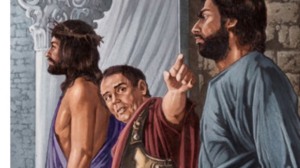Sentenced To Death

We all know the story. Jesus and Barabbas stand before the crowd as Pilate offers to release a prisoner. Knowing Jesus was innocent, Pilate had picked a criminal who led a rebellion and was a murderer as the option. In a sense, Barabbas was a terrorist and his freedom posed a threat to the security of the people of Jerusalem. In contrast, Jesus was a peaceful man who spoke of love for enemies and had shown that love in the many miracles as well as in his speeches. He was no threat to anyone but the hypocritical Pharisees. They manipulated Pilate and placed him in an uncomfortable position and allowing the people a choice between a murder and miracle worker seemed to be an excellent way to avoid doing something he knew was wrong. Yet the Jewish religious leaders stirred the mob against Jesus and they yelled for Barabbas to be released and Jesus to be killed. Faced with the potential of an embarrassing revolt, Pilate yielded to the mob’s demands, released Barabbas and ordered Jesus to be executed. His heart told him that Jesus was a good man, innocent of any wrong, but his bureaucratic mind told him to do what was politically correct. Washing his hands in front of the crowd was his symbolic attempt at removing the guilt from him and placing on others. We know the rest of Jesus’ story but what about Pilate?
We read nothing else about Pontius Pilate in the Bible but Jewish historian Josephus tells us that Pilate’s desire to protect his position by staying out of controversy didn’t save him from a tragic end. A rebellion in Samaria was violently quenched by Pilate but the Samaritans voiced their complaints about Pilate to the governor of Syria and he ordered Pilate to appear before Caesar to address their accusations. Not long after this, according to Eusebius, Pilate, “wearied with misfortunes”, killed himself. The details of his death are uncertain but one of the more popular views tell that Pilate sought to hide his sorrows on a mountain, now called Mt. Pilatus. After spending time in despair and sorrow, Pilate sought to wash his guilt away by plunging his body into the Lake of Lucerne, drowning and going out to eternity, separated from God after being so near. The man who asked Jesus “what is truth?” now knows the truth! Jesus Christ is God and offers salvation. The God of all came to restore the relationship He had with man by dying on the cross. We can be freed from our prisons built by our sin and guilt and liberated by the cross and resurrection of our Redeemer and Lord. What is the truth? Jesus said, “I am the way, the truth, and the life!” Rejoice! Done and Won by the True ONE!
The Day God Took Care of the Establishment and the Insurgent
March 13, 2016, 2:18 am
Filed under:
Searching for our Savior in His book | Tags:
breaking down barriers,
Ephesians,
God,
God's Plan,
God's strength,
God’s glory,
Holy Spirit,
Jesus,
Paul,
prayer,
the Church,
wisdom
My Bible 9 class started writing a book on Ephesians as a class project in the midst of the presidential primaries. Much attention has been given to “insurgent candidates” as well as “establishment candidates”. It seems as if a wall of separation exists which has brought a great deal of tension into the political process. Take this example back to the time of the Apostle Paul and replace insurgent with Gentiles and insert Jews for establishment while changing from a political arena to the church. A tension was in the air which threatened the success of the early church. But as Paul reveals to us in the third chapter of Ephesians, this fit into the plan that God had for the church before creation. Paul recognizes the difficulty that Jewish Christians were experiencing with Gentiles who were trusting God for salvation based on Jesus Christ’s work. While Paul addressed the issue of salvation in chapter 2, he still had to relate to these new Christians the plan God had revealed to him. God revealed to Paul His plan to bring peace in the midst of a world where hostility and division characterized the relationship between Jews and Gentiles. Jesus, the Prince of Peace, brings peace into this hostility by breaking down the barriers. In the Jewish temple, a large wall separated the Jews from the Gentiles. God’s plan was that the cross would bring down the wall, end the hostility, and make Jew believers and Gentile believers into one class of believers, Christian believers. Today, the church still struggles with man-built walls. Today’s walls are built to separate due to ethnic, religious, social class, culture, sex, political views, and a number of other issues, even the type of music or Bibles we use. We live in a world that is growing increasingly dangerous, especially to Christians. We seek to protect ourselves by building walls of separation and unfortunately we are no longer confronting our culture but hiding from it. The church that Jesus is building today, struggles to remove the wall, confront our world with the truth, and build our gatherings in a family that worships and serves as one.
Paul reveals this big picture to this early church. He lets them know that he has been hand-picked by God to be Jesus Christ’s ambassador to all people from all backgrounds. He specifically sees his role as one who is taking the Gospel to the world, in particular the Gentile world. He admits that this message has never been revealed or put into practice before and this concept will produce a big change. He calls this a mystery. This newly revealed truth comes through the Holy Spirit and it a nutshell is this: Gentiles, who were considered “outsiders”, through God’s grace, are saved and adopted into God’s family and are equal with Jewish believers in the church simply by faith in the finished work of Christ in His death, burial, and resurrection.
What I really like in this passage is Paul’s admission that what he was totally unworthy to do this. “The least of all saints” is a powerful reminder that the man who is considered the greatest missionary in history admits that he is a grace-made servant of God, empowered by the amazing power of the Holy Spirit to accomplish what he couldn’t do by his own abilities or skills. He would effectively proclaim the riches of Christ that are so amazing that man can’t even conceive through God’s power alone. Paul took the call of God as the opportunity to shed light to all men about salvation and the building of communities of believers united together and living as one. This body will show that God was wisdom multi-facet and planned by God to be built by His Son, Jesus.
The commitment of Paul is seen by his view of his imprisonment. He doesn’t view being a prisoner for Christ as a negative thing, but as something that God will bring glory through.
What is there right now in your life that is difficult? What makes you struggle at night with sleep? In our society, we face many issues but if we are following Jesus as He calls those who have trusted in Christ’s work to do, the journey leads to bringing Christ glory. Don’t be overcome with discouragement. David wasn’t overcome by fear because his focus was that the fight was the Lord’s. Paul admitted that he saw the same thing. He was the divinely ordained instrument of God and all that he achieved was because God worked in and through him. Prison wasn’t an obstacle to his faithful service but because God was doing it through him, it was an opportunity.
So Paul stops in the midst of writing to share his prayer with them. “Father, from your riches of glory, strengthen Your followers. Show them the need to allow the Holy Spirit to control their entire lives, holding back nothing from Him. Let Jesus live within their inner spirit and let them prosper and grow in the deep roots of His love that dwells within. Father, give your people the power to understand that your love, which is to be seen in them, is a love without limits, going beyond everything that any person was ever learned through experience. Father, flood them fully with Your Awesomeness.”
Paul ends with two verses that have become a popular doxology of praise to God. “Now unto Him, who is able to do exceeding abundantly above ALL that we ask or think, according to the power that works in us; to Him be glory in the gathering and in what Jesus Christ does in every generation forever, amen!”

